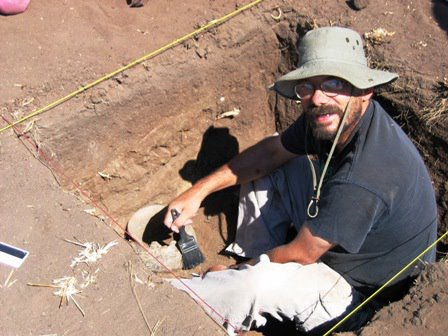I was busy last week and let the LCT Review slide until some friends reminded me about it on Superbowl Sunday. They took issue with the same article I had a problem with: Tony Larsen's taken on why the human species is incapable of affecting the environment. I forced myself not to read this week's edition until finishing a comment on last week, so here we go....
In “An Environmental Blind Spot in Human Perception” Staff writer Tony Larsen takes issue with the news about human influence on the global environment. The main thrust of Larsen’s argument is that humans are too insignificant a species to present any kind of an environmental threat. Humans are dwarfed by the huge scale of our planet and the vastness of the known universe. He writes:
Like our earth’s relationship to its sun in both size and distance, we are only a miniscule part of a massive ecosystem, which is, in reality, globally impervious to our influence. We hardly come up on nature’s radar.
This would be a true statement except for a couple of things. It ignores data from biology on species extinctions; it ignores data from ecology on habitat loss; it ignores data from climatology on global warming; it ignores data from fisheries on the loss of major economic fish stocks; it ignores data from conservation biology on poaching and over-hunting; it ignores zoological data on the rising number of threatened and endangered species worldwide; it ignores oceanic data on levels of toxic waste accumulating in the earth’s oceans; it ignores health, potable water and food shortage data from developing countries who are clearly outstripping their resources through overpopulation; it ignores the increasing threat of humans releasing chemical, nuclear or biological weapons; it ignores substantially more…
Finally, it ignores data from history, archaeology, and paleoenvironmental research, which demonstrates humans’ unfailing and increasing ability to modify the environment around them, often to the detriment of their own existence. The historical and archaeological records are strewn with the debris of cultures that collapsed from their accumulated effects to the environment.
For Larsen, data do not seem to matter. It’s all just about perception:
The way we see environmental issues in today’s charged political climate is due to a classic blind spot in human perception, causing us to commit egregious and costly errors. If we do not soon improve our vision with the corrected lenses of reason, logic and common sense, our present course could be disastrous to future generations.
In making this argument, Larsen himself appears to fall victim to another “perceptual blind spot” that is also endemic to humans: that of allowing our capacity for self-reflection to delude us into believing that humans are somehow special and created apart from the rest of the universe. Such mythology is reinforced in countless religious texts and ceremonies, but is it not an illusion of our own making? After all, it has been wisely stated that man made god in his own image, and not the other way around.
I do not know Larsen’s personal religious convictions (although the fact that he works as staff for the Lassen County Times would lead me to a particular conclusion). Regardless, his argument further appears to follow the spirit, if not the substance, of a biblical literalist worldview which claims that such “natural” phenomena such as life origins, species evolution, geologic processes, and of course, environmental change follow the will of a divine intelligence and are by definition beyond the influence of humans. While not specifically the “The-Rapture-Is-Coming-So-There-Is-Nothing-We-Can-Do-Anyway” argument, I suspect Larsen’s thesis hides more than his written word admits. If so, then Larsen’s basis for claiming human insignificance lacks the historic and scientific validation necessary to view the world through the “…corrected lenses of reason, logic and common sense” as he suggests we humans should do. If his view is not tainted with religious conviction, then it is just an ignorant statement about the nature of science and our real understanding of the universe that we humbly occupy.
Larsen’s view also misses the point. I would agree that at least on a certain level and in the larger scheme of things, humans lack the capacity to seriously impact the planet. But environmentalism has never really been about the fate of the planetary environment, although it is often discussed in those terms. It is ultimately about the fate of the human species. The planet, life, the universe…these are not dependent upon conditions here on the Earth’s surface. The human species is. Pollute the air and the water, set off a nuclear holocaust, kill most of the species on the planet, double the rate of atmospheric warming…the processes of cosmic and organic evolution will simply continue, replacing current life with something else. Humans have no ability to thwart natural selection…a process more powerful than the perceived capabilities of any Designer invented by human culture. Nature will simply yawn at our passing and fill the void with something new and perhaps less arrogant about the purpose behind its existence.
It further reminds me of a poem by Sarah Teasdale, the last verses I provide for you here:
And not one will know of the war, not one
Will care at last when it is done.
Not one would mind, neither bird nor tree
If mankind perished utterly;
And Spring herself, when she woke at dawn,
Would scarcely know that we were gone.
Subscribe to:
Post Comments (Atom)




No comments:
Post a Comment